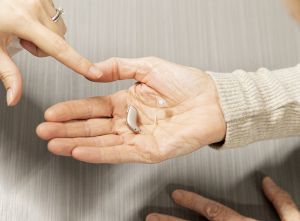A commonly asked question about hearing aids is whether they can be reused by someone else. There are really two main things to consider about used hearing aids: the physical fit and the technology available with the device.
Table of Contents
Should you wear used hearing aids?
First, consider the physical fit of hearing aids

fit someone else’s ears, but most can’t.
The physical fit of the hearing aids can be described according to two basic styles: in-the-ear (ITE) and behind-the-ear (BTE) hearing aids.
In-the-ear style is not likely to fit well
ITE hearing aids are custom-fit, or made specifically to fit an individual’s ear canal. Because the shape of everyone’s ear canal is unique; this style of hearing aid cannot be worn by another person unless the custom shell is remade, which is not always possible and may be cost-prohibitive.
Behind-the-ear more likely to fit
BTE hearing aids are coupled to the ear via custom earmolds or standard ear domes. While someone else’s custom earmolds cannot be re-worn, the hearing aids themselves may be reused by someone else, provided the device is reprogrammed by a practitioner to fit the second person’s hearing needs.
The new wearer would simply need to pair the hearing aids with new custom earmolds or ear tips. Therefore, BTE hearing aids are more likely to be reusable, depending on the technology built into the hearing aids.
To get help, we highly recommend visiting a hearing clinic so they can help program the hearing aid to your individual hearing loss needs.
Technology of used hearing aids also matters
Technology is an umbrella term that encompasses many aspects of the hearing aids, like the power source, the programming capability, the age of the circuit and how well it’s working. A hearing care professional will need to evaluate the hearing aids to determine whether the technology will work for you.
Can I wear used hearing aids?
To find out if they’re right for you, see a hearing care specialist
The first step to determining if a used hearing aid will work for you is to see if they are appropriate for your type of hearing loss. Contact a hearing care professional near you for a complete hearing evaluation. Be sure to bring the hearing aids to the appointment. After quantifying your hearing ability, the practitioner will run electroacoustic tests to determine the amplification and programming capability of the hearing aids to determine if they might be appropriate for your hearing loss.
Some hearing aids are easy to repurpose, if the technology inside is appropriate for the new wearer.
The second step is to have the hearing aids fully inspected and tested by the hearing care professional to ensure they are still in good working order. If there are concerns, they might need to be sent to the manufacturer for reconditioning or repair. After the hearing aids are approved for your use, find out whether they are covered under any existing manufacturer warranty. If they aren’t, consider whether you might want to purchase an extended warranty to cover any loss or damage.
Finally, once the hearing aids are determined to be ready for you to wear, the practitioner will need to program them specifically for your hearing ability. Like any other hearing aid fitting, this programming may require more than one session to fine-tune the hearing aids to your specific hearing, preferences and lifestyle needs.
Be prepared to pay for the services that you need to get your used hearing aid fitted for you. Although you may have received the hearing aids themselves for free, you should expect to pay the professional for a testing and/or fitting fee, as well as any fees for reconditioning or repair that may be needed.
Can I donate used hearing aids?
If the hearing aid won’t work for you, it might work for someone else. One of the best things you can do with used hearing aids—whether they’re in great condition or need repairs—is to donate them to a charity that will accept used hearing aids to be re-purposed, reprogrammed or recycled to assist others in need in both the U.S. and around the world. For example, the Lions Clubs International Foundation collects hearing aids at its recycling centers, which are located around the community in public places like libraries or in audiologists’ office.
More: Hearing loss charities that make an impact

